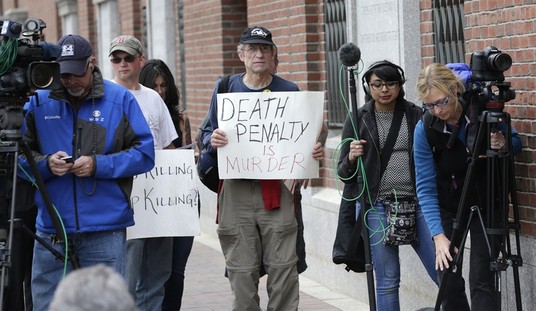“David Carr, Jon Stewart, Brian Williams and Journalism’s Terrible, Horrible, No Good, Very Bad Week” is explored by someone writing from the left at The Wrap, but add to those names the death of 60 Minutes’ Bob Simon, and there’s no doubt that was a week where the planets realigned, and not in a good way, for the elite dinosaur media. (Though in six months, Stewart will likely be hosting a show somewhere.) A media that’s already feeling pretty exhausted after over seven years of first building Barack Obama up into the absurd second coming of Jesus Meets Lincoln Meets FDR, and then having to defend his incompetence and narcissism, and is now resigned to attempting to provide the same services to the Democratic matriarch they needed to trash in the process.
After first discussing the life of CBS’s Bob Simon, whose sneering distortions of Israel we mentioned yesterday, in her latest column, Peggy Noonan writes, “I think NBC essentially ended Mr. Williams’s career as anchor of the evening news, and did what they had to do”:
He could not continue as a reporter of the news, or an interviewer who elicits news, because he could no longer report or grill when the story is lies. And in modern America the story is always lies. The 2016 presidential campaign has already begun. There will be famous gaffes, fibs, embarrassments, embellishments. How can an anchor or reporter ask questions when his own tendency to invent and embellish is well-established and a subject of national mirth?
Why did he invent tales of Bob Simon-like derring-do? He was already at the top and he was brave in the sense that everyone who goes to where the explosions are is showing physical courage. He was impressive without embellishments.
He probably doesn’t know himself. Watching the story unfold I thought of a line from the 1974 film “The Gambler”: “They’re all looking to lose.” Everyone who gambles isn’t only looking for the high, the score, the win but also for the other thing they need, the loss, the brush with death, the adrenal jolt of being ruined.
Mr. Williams’s fictions look very much like a form of gambling. They say he was warned, and he didn’t stop. He must have known each time he was telling an untruth that he was heightening the risk he’d be caught. He came up in the age of videotape and reigned in the age of the Internet. Someone was going to find something, and year by year they didn’t. He added to his stories the way a gambler on a streak increases his bets. “The rocket hit a helicopter” became ‘the rocket hit my helicopter,’ the crime in New Orleans became the gangs that overran his hotel.
Lessons? Anchors shouldn’t be allowed to become anchor-monsters. When management knows its anchor tells tall tales, it has to have the means to stop him. Things that are too big to fail, fail.
Last night, media columnist David Carr of the New York Times died suddenly at age 58 (in his last photos, he looked to be at least three times that age, with a neck the diameter of a pipe cleaner), adding to, as The Wrap dubbed it, old media’s “Terrible, Horrible, No Good, Very Bad Week.” As Noonan wrote, “Everyone who gambles isn’t only looking for the high, the score, the win but also for the other thing they need, the loss, the brush with death, the adrenal jolt of being ruined.” Carr was a guy who ruined himself as a young man via a self-admitted crack addiction, and then clawed back from the abyss, to become a media columnist for the New York Times and go-to Drudge source.
Starting last night, I watching the over-the-top glowing tributes to Carr pouring out over Twitter (from many of the same people who called Andrew Breitbart the anti-Christ upon his untimely passing). The response reminded me a lot of the reaction after Teddy Kennedy’s death, and the notion that on the insular left, to paraphrase John Madden after a team puts it all together to go from the bottom of the NFL to winning the Super Bowl, having the correct politics is the best deodorant. Speaking a kernel of truth to the besotted, there’s a guy on Twitter who’s been retweeting this today to everyone in old media who have been offering their hosannas to Carr:
.@jaketapper i bet his girlfriend remembers whatever she did to deserve that time he beat her & broke her rib, too pic.twitter.com/zIDoSUPiJD
— Snark Enlightenment (@jokeocracy) February 13, 2015
And as the Washington Post adds today, “David Carr’s final truth about addiction: You never really beat it”:
He became a small-time dealer in Minneapolis, evincing what he often called a pathological need for narcotics, graduating from coke to crack, from jail to halfway houses. “In retrospection, I’ve always thought of my career, both as a journalist and an addict, as a series of rapid ascents and declines,” Carr wrote in his book. “But after a year of investigating my past, it became clear that I had been chugging along pretty nicely until 1986, and then dropped off the face of the earth in 1987 when I started smoking cocaine.” But even at his depths, there was his craft. “Regardless of what happened to me, I rarely stopped typing,” he wrote. “Perhaps I was worried I would disappear altogether if I did.”
The Post’s obit for Carr ends with one of his quotes: “I could be drunk tomorrow or shooting dope even as you read this, but the chances of that are low as long as I make a daily decision to embrace who I really am and then be satisfied with that at the end of the day.” And whatever inner demons remained in Carr’s soul (likely many), outwardly, he acted very satisfied with who he became. Very. This clip from the 2011 documentary Page One: Inside the New York Times has been getting massive play on Twitter, usually in conjunction with the Jon Stewart fanboy-style preface, “Watch David Carr DESTROY some guys from Vice.com!!!!1!!!!”
[jwplayer player=”1″ mediaid=”78787″]
You can see everything wrong in both new and old media in that short clip. The guys from Vice who are acting as if it’s the first time anyone has heard that Liberia is a Third Wold hellhole and dressing like they’re the second coming of Don Draper. Carr sitting behind his desk mugging for the documentary cameras, pretending he’s a cross between Mencken and Ben Bradlee, smashing away at his laptop keyboard and basking in the past glories of the paper who hired him. It’s a miracle anyone in the Times‘ office building is still alive, after their meeting adjourned and the Katrina-sized smug cloud generated by everyone in that room escaped into the hallways.
As Carr himself said in his autobiography, “I now inhabit a life I don’t deserve, but we all walk this earth feeling we are frauds. The trick is to be grateful and hope the caper doesn’t end any time soon.” For Carr, being grateful to his employer and ensuring “the caper” didn’t end meant always managing to insult the provincials (a word Carr himself used when describing Piers Morgan’s ratings woes at CNN last year) to help protect his position in the leftwing caste.
Over a decade ago, Christopher Caldwell of the Weekly Standard explored the lament of the small-town wannabe “Progressive“:
At some point, Democrats became the party of small-town people who think they’re too big for their small towns. It is hard to say how it happened: Perhaps it is that Republicans’ primary appeal is to something small-towners take for granted (tradition), while Democrats’ is to something that small-towners are condemned for lacking (diversity). Both appeals can be effective, but it is only the latter that incites people to repudiate the culture in which they grew up. Perhaps it is that at universities–through which pass all small-town people aiming to climb to a higher social class–Democratic party affiliation is the sine qua non of being taken for a serious, non-hayseed human being.
For these people, liberalism is not a belief at all. No, it’s something more important: a badge of certain social aspirations. That is why the laments of the small-town leftists get voiced with such intemperance and desperation. As if those who voice them are fighting off the nagging thought: If the Republicans aren’t particularly evil, then maybe I’m not particularly special.
Which may be the element that ties together the life stories of Brian Williams, David Carr and those lamenting their loss in the world of elite media this week:
david carr grief twitter is a masterclass in the art of the humblebrag.
— Ricardo Bilton (@rbilton) February 13, 2015
Update: A preoccupation with having the proper caste also ties in with the other big story old media is obsessing upon this week.
More: Go home CNNMoney, you’re drunk. Or come back when you actually are drunk. Either way, time to rethink your premises here.










Join the conversation as a VIP Member